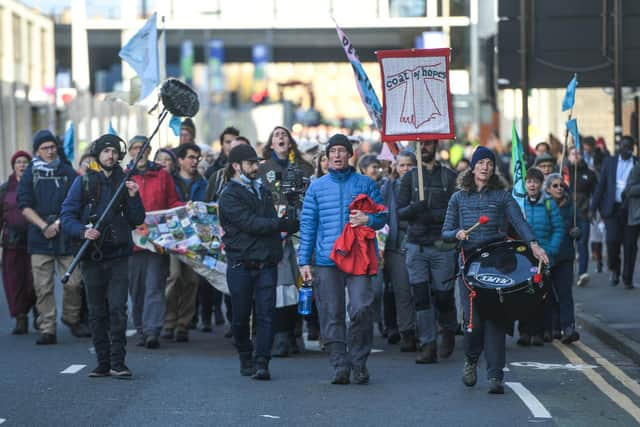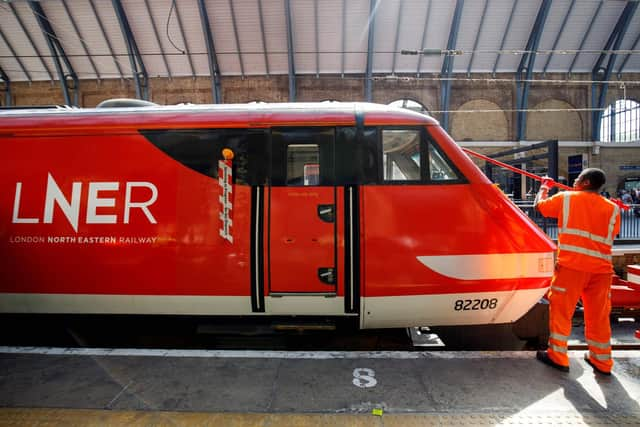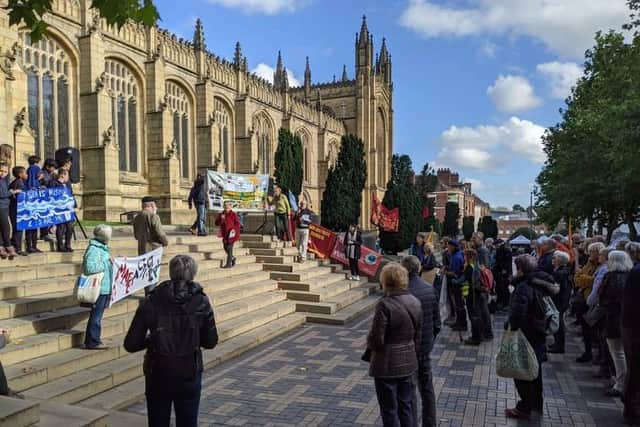If councils and people are to succeed in climate change fight, they need the resources to do it
and live on Freeview channel 276
I didn't even make it all the way back to Wakefield by rail on Sunday, as power line failures meant the train, which was severely delayed anyway, was exiled back to Doncaster.
From there I was rescued and taken home - by car. I might get some cash from my tickets back, but previous experience teaches me not to hold my breath.
Advertisement
Hide AdAdvertisement
Hide AdEveryone has their own tales of public transport hell, but they feel particularly apt in the week the COP26 rocks up in Glasgow.


Pre-conference, the warning sirens are getting louder and predictions about the earth's future gloomier by the day. In Wakefield, late-October temperatures were mild enough for trick-or-treaters to leave their coats at home.
As COP26 starts, Wakefield Council's pledge to effectively wipe out its own carbon footprint by 2030 turns two-and-a-half years old.
Casting the mind back to the May 2019 debate when the promise was made, it springs to mind how one councillor suggested poor public transport was undermining the green agenda and forcing people to drive.
Advertisement
Hide AdAdvertisement
Hide AdThirty months on, you'd be hard pressed to see how anything has improved in that regard.


A chronic shortage of bus drivers has prompted Arriva to cut three local services in Wakefield and make a raft of timetable changes on many others.
Trains meanwhile, are evidently still being trains. Passengers could see their fares being hiked by nearly five per cent in the new year - the biggest rise in a decade.
Stuart Boothman, from campaign group Just Transition Wakefield, says he feels the council is "doing better than some" to address the climate emergency, but that its hands are tied.
Advertisement
Hide AdAdvertisement
Hide Ad"Some of the things it may have done aren't in local authority control and are very much in the hands of central government," he says.


"Wakefield is neighboured on three sides by motorways. That's national infrastructure which is outside of the council's own control and they don't even have the powers to cut the peak hours speed limit."
Mr Boothman says he recently asked the council about doing just that, with a view to replicating the 60mph limit in place on the A1 around Sheffield during busy times.
The response: the council can't, even if it wanted to, because the air quality levels are above the threshold set by the government.
Advertisement
Hide AdAdvertisement
Hide Ad"It's obviously good news that the air quality here isn't that bad," Mr Boothman adds. "But dropping the speed limit is a short-term measure that would make the air quality so much better.


"It should be easy to implement, but it's national infrastructure."
There is frustration too with planning policy.
For years, local politicians have moaned about the frequent clash between the way new homes are built and the climate change agenda.
They also gripe about how hard it is to take developers to task for, among many other things, not being green.
Advertisement
Hide AdAdvertisement
Hide AdNew homes are being fitted with gas boilers rather than eco-friendly heat pumps, a situation Mr Boothman describes as "inexcusable".
Back at County Hall, council officers have expressed confidence that the 2030 pledge is achievable and will be met.
The likely building of two new solar energy parks in Ossett and South Kirkby will neutralise the council's electricity supply within 18 months of being functional, we're told.
LED lightbulbs and tree planting are also playing their part.
Advertisement
Hide AdAdvertisement
Hide AdAnd anecdotally, there seems to be growing sympathy for the climate change agenda locally.
The Spanish walkers who marched into Wakefield en route to COP26 on October 15, were genuinely overwhelmed by the numbers in the city who turned up to greet them.
We're told it was a turnout greater and more vociferous than they got in places far larger than ours. Campaigners say their leaflets are not being thrown in the bin by passers-by, as they might once have been.
But to turn that goodwill into something meaningful, people need help to make lasting and sustainable change.
Advertisement
Hide AdAdvertisement
Hide AdAt the risk of banging the same old drum, buses and trains need to turn up and be an affordable alternative to the car.
Is it realistic to expect the average Wakefield man or woman to spend more than a quarter of their annual income on a household heat pump?
And perhaps our political system needs to work better to make change quicker and easier.
We live in an age where being in favour of devolution has become the mainstream stance.
Advertisement
Hide AdAdvertisement
Hide AdSuggesting that decision-making should be made 200 miles away in Westminster is now seen as almost blasphemous in some quarters.
In that climate, it seems daft that councils still don't have basic powers, or even just influence, to take pretty straightforward steps to make their places greener.
Motorways and housebuilding would be good places to start.
In short, world leaders, if you want us to do our bit, give us and the local people we elect the tools to do the job.
Local Democracy Reporting Service